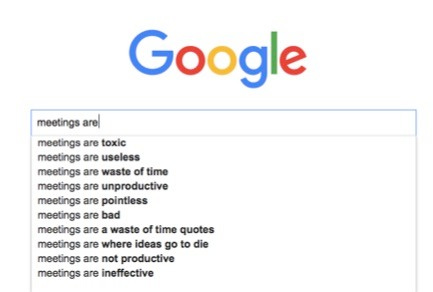How To Turbo-Charge Meetings
Type “meetings are” into Google, and the search engine will suggest “toxic,” “useless,” “waste of time,” “unproductive,” “pointless,” and “bad." Meetings have a terrible reputation in business, and for understandable reasons. The overwhelming impression we have of the conference room gathering is an inefficient time-suck, where self-important managers rattle off facts and figures that could have been shared with us beforehand.
Here’s the main problem: we are using meetings to share information, a practice made completely obsolete by technologies as simple as email. Even though we know this, we still meet in person to disseminate data, a process only slightly less anachronistic than filling in paper spreadsheets with a pencil.
This practice absolutely sucks the life out of meetings, because all participants know in such moments that their time could be better spent doing almost anything else. Plus, the information isn’t being absorbed by anyone, because it’s not needed at that point. Most people will simply wait for the "meeting summary" email that inevitably follows for any information they actually need.
So here’s a rule of thumb: anything that you can convey in an email, a PDF, or even a Youtube video, should not be meeting material. It’s a waste of precious time. In fact, it’s been estimated that $37 billion per year is wasted on unproductive meetings! Although shocking, it’s understandable, given that the average employee spends 31 hours per month in meetings. It adds up quickly.
But not all meetings are a waste. Some are useful. Getting together for a meeting makes sense when you need to collaborate or make important decisions – two tasks that benefit from face-to-face interaction between colleagues in real time. Synchronous communication should be saved for such duties.
In fact, this is precisely how I run the business ethics class that I teach at Yale. I don’t lecture. I rarely even discuss the assigned reading, instead confirming students have done it via short written reactions they email me the night before we meet. Precious class time is protected for dynamic, multi-directional cooperation, interaction, and collaboration. In this day and age, there is absolutely no reason for me to burn minutes sharing information.
Precious class time is protected for dynamic, multi-directional cooperation, interaction, and collaboration.
Rather, in-person meetings and collaboration go together. In education, this insight is reflected in the “flipped classroom” approach, where students imbibe instructional content in the evenings and use class time to work together with their peers and teachers. There is some (very preliminary) evidence that this approach improves educational outcomes and student engagement.
So how can we do this in the office setting, given the historical baggage of regular meetings to “update” teams? Well, consider this: the rapidly growing office communications startup Slack recently cancelled all recurring meetings. Why? To see which were really necessary. As the company’s founder Stewart Butterfield stressed, this was about respect: "Respecting people’s time is important…If you’re going to call a meeting, you’re responsible for it, and you have to be clear what you want out of it.”
Slack’s software allows businesses to make all of their communications accessible to all employees. Need to know the latest sales figures for the Southern District? Just search for it. Want to know how recruitment is trending? Just search for it. By making information free for all to find, employees can effectively have on-demand access to what they need, when they need it. Start-ups and new media companies have adopted Slack’s software, and it’s even used to help improve collaboration and information flow at NASA’s Jet Propulsion Laboratory.
Turbo-charging meetings may be as simple as changing how we think of them. If a meeting is for sharing info, try eliminating it. If it is for collaboration, encourage interaction and engagement from all. Doing so is likely to raise participants’ engagement, happiness, and feeling of impact, and ultimately produce more creative ideas and better decisions.
If we follow this rule of thumb, Google’s search suggestions could look entirely different in ten years, maybe even starting with something we would never have expected to see if we hadn’t changed our thinking: “Meetings are fun.”
Vikram Mansharamani is a Lecturer at Yale University in the Program on Ethics, Politics, & Economics. He is the author of BOOMBUSTOLOGY: Spotting Financial Bubbles Before They Burst (Wiley, 2011). Visit his website for more information or to subscribe to his mailing list. He can also be followed on Twitter or by liking his Page on Facebook.





